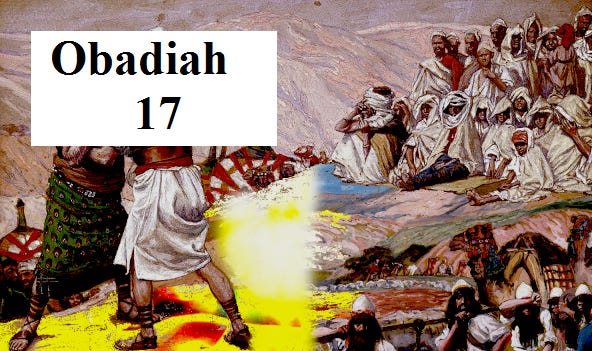I begin composing this translation on the 1st of April 2024. This is the first verse since I took a break for Holy Week.
NJV: But on Mount Zion will be those who have escaped – it will be a sanctuary – and the House of Jacob will recover what is rightfully theirs.
Kurukh: Bhurʈā Mathnī nū phuʈ ara phuʈā ra’ō – Eɽpāpallī Guɽxis taŋghay xekkhan karaj’ō.
But on Mount Zion will be deliverance and holiness = Bhurʈā Mathnī nū phuʈ ara phuʈā ra’ō
Bhurʈā = Zion
Mathnī = Mount
nū = on
phuʈ ara phuʈā = deliverance and holiness
ra’ō = it will be
Zion comes from the Hebrew tseeyaw’ (ציה) dryness, drought.
bhurʈā has several meanings:
1. to scorch
2. to dry up
3. to bamboozle.
All these capture part of the meaning of Zion. It is where the Israelis retreat to receive the Lord’s Judgement. Those who know not the Lord will not know to find them there.
bhurʈā includes a fourth meaning:
4. to burn off the bristle of a slaughtered pig.
So great are the adulteries of Israel and Judah, that this is how the righteous refer to them.
deliverance and holiness= phuʈ ara phuʈā
deliverance comes from the Hebrew word pelaytaw’ (פליטה) escape.
holiness comes from the unused Hebrew word ko’desh (קדש) apartness.
phuʈ means escape door/back exit.
The reduplicated form phuʈāphuʈā means different/distinct.
the House of Jacob shall possess their possessions = Eɽpāpallī Guɽxis taŋghay xekkhan karaj’ō
Eɽpāpallī = house
Guɽxis = Jacob
taŋghay = their own
xekkhan = possessions
karaj’ō = will take possession of
eɽpāpallī has two components:
1. eɽpā = house, hut, family, building, home or beehive.
2. pallī = one’s own household & family/chattels.
In Kurukh, pall means tooth, power or pride.
Jacob comes from the Hebrew awkabe’ (עקב) heel, footprint, hindpart.
Guɽxis is just guɽxī heel with the Singular Masculine Suffix attached.
Oddly enough, -s is the Masculine Singular Nominative Suffix in both Greek and Kurukh.
In addition, the Accusative Suffix in both languages is –n and –in/-n respectively. (Greek drops the –s, but Kurukh keeps it.)
These two languages are from different families.
We see the Kurukh accusative in xekkhan.
xekkhā includes the following meanings:
1. hand & arm
2. cubit
3. possession
4. charge/authority/power to command
5. act/operation.
The Hebrew morawsh’ (מורש) appears only thrice, meaning either possessions or wishes.
KJV: But upon Mount Zion shall be deliverance, and there shall be holiness; and the house of Jacob shall possess their possessions.
Kurukh: Bhurʈā Mathnī nū phuʈ ara phuʈā ra’ō – Eɽpāpallī Guɽxis taŋghay xekkhan karaj’ō.



